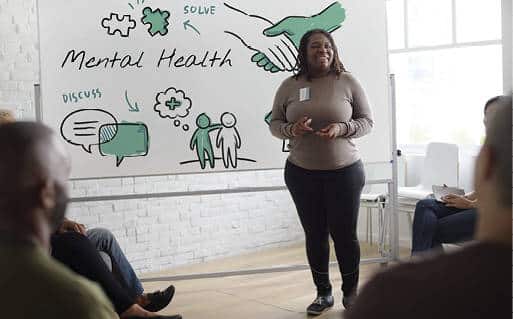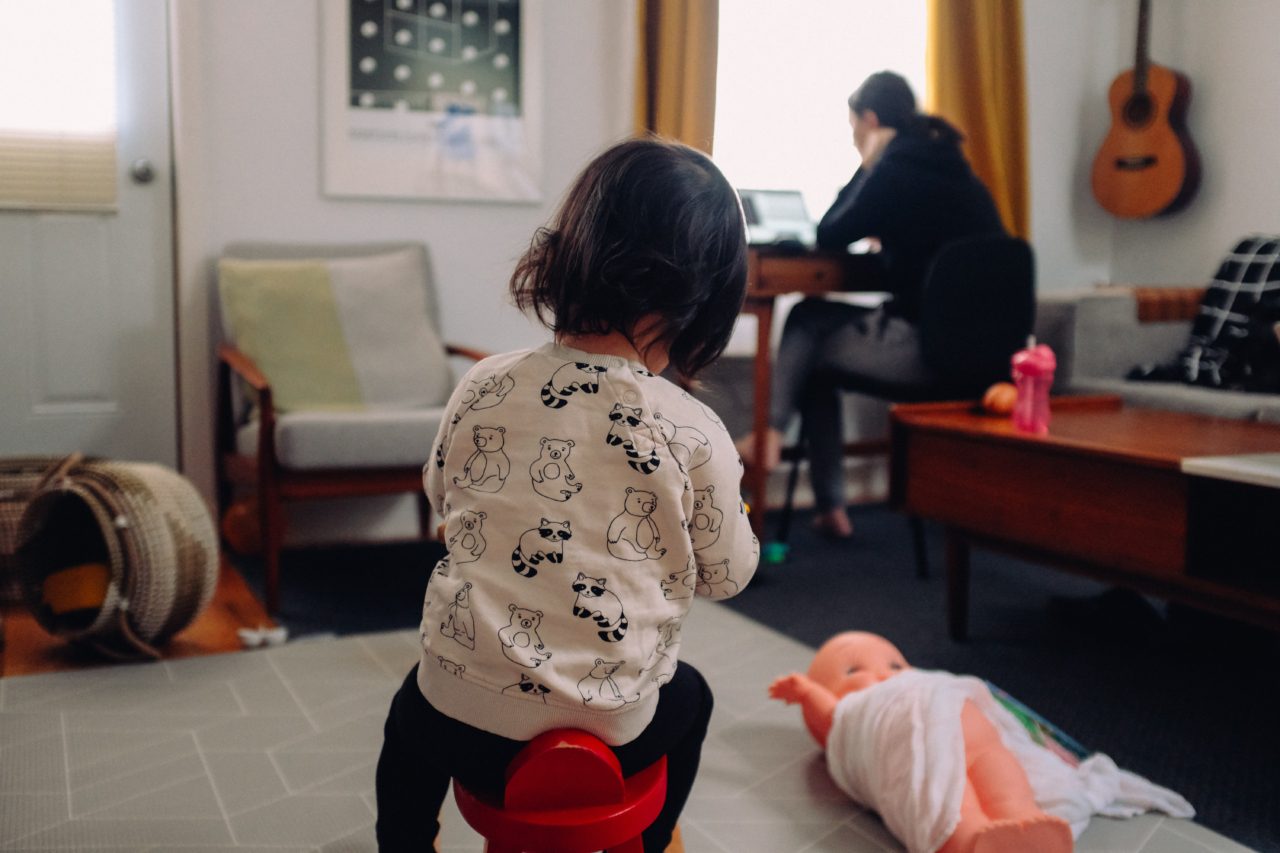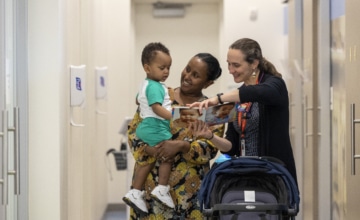Katie Kao, John Hornstein, and Mindy Rosengarten, Brazelton Touchpoints Center, Boston Children’s Hospital, Boston, Massachusetts; Portia Kennel, Buffett Early Childhood Fund, Omaha, Nebraska; Mindy Zapata, Southwest Human Development, Phoenix, Arizona; and Catherine Ayoub, Harvard Medical School, Brazelton Touchpoints Center, Boston Children’s Hospital, Boston, Massachusetts

Abstract
Over the last 2 years, the COVID-19 pandemic has compounded the way in which two-generational, early childhood education programs partner with families. As providers and families reported their COVID-19 challenges, Head Start and Early Head Start programs adapted an evidence-based professional development model for family service professionals. The aim of this model was to support staff capacity for reflection and help apply strength-based practices. ConstructTM coaching supported the transition to virtual communication and added capacity to stay connected with families. This family engagement coaching model offered self-care and professional guidance for a staff working in a world of crisis and change.
I noticed that if parents meet a lot more virtually, they reach out to me a little more than they did in person. In person, they see me and we check in and then they usually go about their day. But I feel now [with COVID-19], since families have more problems and issues and things going on, I get reached out to a little more. Not every time do I get a response, but when they actually really do need something, they reach out to me more than before. —Family Service Professional, August 2020
The COVID-19 pandemic has been devastating for families, early childhood education (ECE), mental health programs, and communities (Weiland et al., 2021). At the same time, understanding how the professional community has responded to this crisis provides an unprecedented opportunity to consider fundamental changes in how to provide support and services.
More specifically, the pandemic has compounded and changed the way in which two-generational ECE programs partner with families. Throughout 2020, as the pandemic expanded, 63% of ECE programs closed to on-site services (The White House, 2021). Head Start and Early Head Start programs, with strong federal support, were able to maintain their staff and transition to virtual service delivery. With families participating from home, family service professional (FSPs) often became the primary voices from programs communicating with families and, through them, with their children. To be successful in this extended role, FSPs had to pivot and become facile with virtual technology, interface with new and changed resources, and communicate with families in new ways. As the pandemic continued, so did the need to communicate and also to adapt. In the spring of 2021, programs that had been closed began to open again, but with very different expectations for families. Again, in Head Start Programs, families and FSPs explored new dimensions of reopening and sometimes closing again (Weiland et al., 2021).
During the pandemic, grounded and adaptable needs assessment processes, and family engagement support and skill building practices for FSPs, helped programs respond to constant challenge. This article describes a group of Head Start and Early Head Start programs that, beginning in January 2019, were involved in implementing an evidence-based family engagement coaching intervention, the ConstructTM coaching model, that became one of the key support and learning features of their COVID-19 experience. Through this collaboration, called Project Breakthrough, participants were able to document a system of challenge identification, resource development, and family engagement coaching practices to support families. This intervention system provided stability and professional validation for FSPs and connection and help for the families they served.
The Family Service Component
Over the last decade, the family service component of Head Start and other early childhood programs has gained both relevance and increased prominence. As much as the family comes to their programs for specific services such as early childhood education, program staff members essentially join the system of care around the child. Increasingly, they provide services consistent with the goals and practices of the family, forming a partnership in which professionals provide expertise and access to resources, and families bring their own informal supports, resources, and aspirations. The Construct coaching model described here was designed to upgrade the family service component of ECE programs. During the current pandemic, with many children and families struggling with health, mental health, and meeting basic food and shelter needs, the skills of family service staff are being tested.
Early in 2020, as programs were suspending and curtailing services due to the pandemic, the project collaborators in consultation with the participating programs decided to proceed with the implementation of the coaching model. Program leaders believed that the coaching approach tested should both withstand such crises and be particularly relevant when stresses on families and programs are at their greatest.
Coaching has made it easier in the middle of chaos because I go in with a plan.—Family Service Professional, December 2020
The Construct Coaching Approach
The Construct coaching model for FSPs is based on a network of relationships among FSPs and families, coaches and FSPs, staff and program leadership. A central tenet of the model is that effective professional development occurs when practices are applied in direct work with families. Staff members are first trained in the practices and then engage in a process through which they apply and reflect on those practices in a systematic manner. This reflection is carried out in two ways, through one-on-one coaching, and within a professional learning community.

To be successful in this extended role, family service professionals had to pivot and become facile with virtual technology, interface with new and changed resources, and communicate with families in new ways. Photo: shutterstock/Pheelings media
Family Engagement Practices
Family engagement practices were developed via focus groups of FSPs whose performance measures showed positive, goal-directed partnerships with families. This process resulted in identifying 16 family engagement practices (see Box 1) that serve as tools for FSPs to use in building relationships with families, navigating, conversations, and working toward family-identified goals. An FSP shared the application of the practices during the pandemic:
…the Construct principles, it gives me confidence to talk to them because I feel like I can navigate conversations. They helped me navigate difficult conversations. Now it’s more meaningful, more intentional, there’s more understanding on my part. I’m also able to pick out different things out of the conversation—see it as a whole.” —Family Service Professional, September 2020

Coaches use empathy, active listening, reflection, and communication in supporting transformative professional growth. Photo: shutterstock/Rawpixel.com
Box 1. ConstructTM Coaching Family Engagement Practices
Southwest Human Development developed a list of 16 observable practices to measure quality family engagement:
- 1. Listening to understand
- 2. Engaging in shared attention
- 3. Facilitating open-ended conversations/asking open-ended questions
- 4. Promoting parent’s understanding
- 5. Responding to the cues of the parents
- 6. Providing relevant resources
- 7. Following parent’s lead
- 8. Recognizing and encouraging persistence
- 9. Reviewing next steps and expectations
- 10. Promoting/providing problem-solving strategies
- 11. Prioritizing communication/establishing and maintaining consistent communication
- 12. Offering simple challenges
- 13. Creating opportunities for discoveries
- 14. Practicing confidentiality and maintaining professional boundaries
- 15. Supporting individualized learning styles through customized delivery of information/materials/conversations
- 16. Supporting peer to peer interactions
Coaching
Central to the process of establishing effective family engagement practices with families is the relationship between the FSP and their coach. Coaches use empathy, active listening, reflection, and communication in supporting transformative professional growth. Coaches and FSPs jointly engage in systematic reflection, planning, and identification of the next professional practice goal. This parallels the process that the FSP uses with families. Coaches can be a family service manager or a designated coach from within or in consultation with the program. If the coach is the administrative supervisor of the FSPs, the dual roles need to be clearly differentiated.
The coaching process is a learning sequence in which the FSP first learns the family engagement practices, then applies them in action with coaching, and then uses them fluidly and naturally. The progression begins with learning those practices that are easier to apply and iteratively moving toward those that are more difficult. Similarly, practices are first applied with families that are easiest to work with and later with those who are more challenging for the specialist. The Construct coaching cycle is built on an evidenced-based sequence that includes modeling, observation, feedback, reflection, and planning as core strategies.
This coaching cycle is supported by a technology platform accessible to both the coach and the FSP indicating the setting and focus of each observation and both numerical and quality data on the use of specific practices. These data are used by the coaches and FSPs to inform the coaching process in relation to the learning trajectory of the FSP. Further, the data generated in the technology platform are reviewed by the program evaluators and discussed by the project’s leadership team, providing feedback to the programs and informing future planning. Implementing the coaching cycle during pandemic led to more focused self-reflection on the part of FSPs:
And I’m looking at myself as the FSP looking from the outside in, I can read my own cues. I need to stop shaking my head so often. Because it now looks like I’m just agreeing with everything this parent is saying. And if I’m trying to practice empathy then am I really doing that just because I’m smiling and I’m shaking, nodding my head yes. I think the video conference calls have helped. It allows me to see what I’m doing right, what I’m doing wrong, what I can fix or work on. And if I’m actually asking the questions to where the parent’s understanding because I’m reading my cues. I’m reading their cues.—Family Service Professional, September 2020
Program Level Supports
Coaching is embedded in a larger systemic process of integrating the family engagement practices into the culture of the programs. A reoccurring professional development event, titled the professional learning community (PLC), is designed and delivered as a collaborative experience that provides a foundation for application of the family engagement practices. It is facilitated by coaches or jointly by family service managers and coaches through activities that allow for collaborative thinking, professional sharing, and reflection about timely delivery of family services. Prior to COVID-19 these PLC events were facilitated as in-person professional learning events. Although these events have moved from in person to a video conference format, the collaboration and value derived from the PLC learning events have continued to be a relevant outcome of the project.
The process of initial onboarding programs involved a 2-day in-person or video conference event to introduce coaches and/or coach-supervisors to the Construct coaching model, the family engagement practices, the PLC model, and the data collection software. Training for coaches and family engagement supervisors is vital for the success of the family engagement workforce, particularly as communities adapt to COVID-19.
Systematic supports include “Office Hours” where the project’s national network of participant coaches and/or coach-supervisors can access peer support on demand and targeted site support for coaches and/or coach-supervisors. Co-facilitation of PLCs with project sites has created a parallel of collaboration for coaches and family engagement supervisors with the project team in meeting the needs of FSPs during COVID-19.
The Construct Coaching Family Engagement software supports real-time, data-informed professional development implementation that maximizes the delivery of virtual and on-site coaching, feedback and reflection, and planning. It is built on an evidenced-based approach that includes data collection on modeling, observation, reflection, and planning. Data are reviewed at regular intervals; typically, every 3 months. Review identifies potential adaptations to family engagement and coaching interventions, which may be integrated into the program’s continuous quality improvement approach.
Evaluation of Challenges and Needs During the Pandemic
As part of the Construct coaching project, family needs and concerns, as well as family service staff needs and concerns, were gathered systematically. The project collected surveys from supervisors, coaches, and FSPs in fall 2020 that included a section of COVID-19 related questions to assess the impact of the pandemic on staff and families as well as to measure change in provider–family relationships and efficacy support. Surveys were followed by interviews conducted approximately 6 months into the pandemic with FSPs and coaches.
Areas of need, methods of communication with families, and perceptions of program planning during the pandemic were summarized and shared with the 16 coaches and FSPs from the four participating Head Start/ Early Head Start programs in Omaha, Nebraska, and Chicago, Illinois.

The project collected surveys from supervisors, coaches, and family service professionals in fall 2020 that included a section of COVID-19 related questions to assess the impact of the pandemic on staff and families… Photo: shutterstock/Thomas Andre Fure
Provider Challenges
Providers, FSPs, and their coaches were asked to identify areas of challenge during the COVID-19 pandemic in five general categories: family, mental health, basic needs, work, and health (see Figure 1). The most commonly identified challenges for FSPs were related to mental health and feeling sad, down, or hopeless; a little more than a third (38%) of the FSPs mentioned this as a critical challenge. The remaining three areas of challenge described by FSPs were: feeling lonely; concerns about their health needs, and the stress in going to work. One FSP explained the challenges she has faced as a result of the pandemic,
I miss people, and the nuances of small chatter. Sometimes, coworkers are like friends as well. It was not just depression, but got to a point where I needed to get out of this house and go meet people, or be with people. Because of that, I’m going to go crazy. —Family Service Professional, August 2020

Remaining concerns of FSPs were all related to illness, many specifically to illness and death due to COVID-19. Professionals either knew of someone who died from or experienced someone close to them dying from the virus. Stress in the service provider community parallels that of families and of the society as a whole. The skills and supports necessary for these professionals to be successful with families should consider specifically how staff work with families in this context.
You put your oxygen mask on first before you help others. So if family support staff aren’t getting the oxygen they need, how can we expect them to help the families that need it too? —Family Service Professional, August 2020

Stress in the service provider community parallels that of families and of the society as a whole. Photo: shutterstock/Boyloso
Stressors for adults are similar in all four Head Start and Early Head Start programs serving families primarily from low-income African-American, Hispanic, and White groups. According to the report by the Urban Institute (Weiland et al., 2021), these are the very families who have been most impacted by COVID-19. Finding solutions to increase and extend their support and increase and solidify relationship through their child’s early education program is one important protective factor to counter these disparities.
Family Challenges
When asked about families, FSPs reported that their families also were worried about health needs, specifically the threat of illness and death from COVID-19. Families also described issues with working from home, losing their jobs, and, as a connected issue, trouble paying bills and concerns about basic needs. From a mental health perspective, families experienced depression, anger, sadness, as well as issues with relationships, managing difficult people, and concerns on conflicts with partners and other family members.
Both FSPs and families share a number of the same concerns about mental and physical health, job security, remote learning, and basic needs. They all talk about the concerns specifically related to COVID-19 and the fear of illness to themselves or their families. Another stressor frequently cited in relation to families, as well as the providers themselves, was having children at home while working:
We want to fix problems by throwing money at them and that wasn’t really the highest need. It was more about being able to parent their children 24/7 without losing their minds, knowing what to do with their children, dealing with stress, dealing with isolation. It was more mental health, social–emotional type needs. And now as we’re going, you know, everything’s opening up, people are back to work, but the schools aren’t open. —Family Service Professional, August 2020
Relational Benefits and Challenges
The pandemic changed the way in which FSPs and families relate to each other. The more obvious change is in the transition to more virtual communication. Less transparent changes included the development of a new kind of partnership. Further, the pandemic also affected how staff members within a program communicated with each other. Virtual communication has increased connection opportunities with families while at the same time presenting barriers to communication.
Sometimes feeling helpless, doubting myself. Am I doing enough for these families from a computer screen? Are they feeling supported by me if I’m not even there—because I really value the interactions in person. And just the whole pandemic has caused me to think—am I doing what I’m supposed to be doing? Am I doing enough? Am I really being supportive? Do the parents really feel like we’re there for them? And if we’re saying I’m here for you, am I really here for you? —Family Service Professional, August 2020
One change cited by several FSPs is related to the shared experience of the pandemic, and how that affects the mutuality of the relationship.
I call and check in on a parent and at the end they’re asking how [I am] doing. Which I kind of think, a lot of times the relationship can feel imbalanced, your worker’s up here and you’re down here. So I think [the pandemic] has made it feel a little bit more like we’re equals. And, obviously there’s still boundaries. But I think it’s empowering? That’s not the word, but it brings a closeness to our relationship. —Family Service Professional, August 2020
Similarly, relationships with other program staff have been affected:
Well now, we definitely have to collaborate more and when we do meet, our team meetings are usually Friday on video conferences. So we do have to collaborate more with the teachers. —Family Service Professional, September 2020
Addressing these relational challenges is significant for the role of FSPs in the future. Can the response to the pandemic lead to conclusions about the professional development needs of these staff as well as to their changed role within the constellation of services provided to families?
Resources and Support for Family Service Professionals
The pandemic affects both the amount and nature of needs families face. Identifying specific resources and supports is an essential component of the service system’s response.
In identifying these needs we asked family-facing staff to identify helpful resources (see Figure 2). The most helpful resources for providers reported by staff included those on mental health, food, and housing. Family service professionals described how they have been able to support families during this time:
For example, in this time, families don’t have work. People don’t have money. And they need to pay all expenses for home. They need food for the family, for the services, for everything that they need. So, we can provide from the school directly some supplies that can help people. —Family Service Professional, September 2020
On a personal level, the most helpful resources for family-facing providers and program leadership included resources on mental and physical health. It is clear from these responses that the range and amount of resources required, as well as access to such resources, requires a substantial effort on the part of staff.
We went through some rough patches with not only the pandemic but with the civil unrest, and—different things like that, so we had families that needed resources for grocery stores because all the grocery stores in their communities had been looted and just torn apart. We had to try and get them resources and medicine and food and stuff. —Family Service Professional, September 2020

Supervisors, directors, and coaches reported on how they established and maintained a positive climate in their organizations during COVID-19, for example: establishing positive relationships with staff members; creating an environment with predictable routines; and modeling self-care practices. Organizational support was another specific factor noted by family service staff as contributing to their well-being during the pandemic.
You cannot expect people who are experiencing trauma to be able to truly help people who are experiencing trauma and support them when they do not have support. —Family Service Professional, September 2020

Families also described issues with working from home, losing their jobs, and, as a connected issue, trouble paying bills and concerns about basic needs. Photo: shutterstock/Damir Khabirov
Applying Construct Coaching During the Pandemic
Given the devastating effect of the economic shutdown, community and family disruption, and the significant stress and isolation felt by families, the detailed data collected about the adaptation and implementation of the model during COVID-19 allowed for the mapping of family engagement services in response to these stresses.
With FSPs assuming a more primary role in communication with families while children were not in classrooms, their relationship to other staff members becomes more essential. Simultaneously, applying the Construct coaching model during this period allowed for deeper reflection on the practices used in engaging with families:
I definitely do pull out that sheet with all the 16 practices more often, and I kind of look over before I call. And then I just use a minute of reflection before I dial that phone to figure out what is it that I’m trying to gather, what is it that I want to share, and then what is it that I want to move forward, review next steps and expectations. —Family Service Professional, September 2020
The central focus of the Construct coaching model, and hence its evaluation, is in achieving significant change in the quality of family service to families. In April 2019 of the first year and in October 2020 of the second year of the Breakthrough project, evaluators collected two standardized measures on strengths-based practices. The goal was to measure whether providers’ perception of their use of strengths-based practices with parents and with other providers changed over time during the course of implementing Construct coaching, and ultimately in response to the pandemic. The measure evaluated the following domains of the parent– provider relationships: (1) Identification and Use of Strengths, (2) Cultural Competency, (3) Sensitivity and Knowledge, and (4) Relationship-Supportive Behavior. Staff were also interviewed to determine their responsiveness to, impressions of, and learning from Construct coaching:
I’ve worked here a long time and it’s the best thing that’s come around as far as evaluating and putting concrete measures to the work that we do. It’s the most spot-on evaluations I feel like we’ve ever used.—Family Service Professional, July 2020
Coaches and FSPs had significantly higher scores in each of the four subscales of the Strength-Based Family Service Inventory (Green et al., 2004) in 2020 during the pandemic than they did in 2019, before the pandemic. These findings suggest that coaches and FSPs showed better strengths-based perspective when working with families over the course of 18 months even with the pandemic as the stressful backdrop of the work.
With the pandemic occurring in the second year of implementation of the Construct coaching model, the simultaneous effect of increased stress on families with the increased intentionality of engagement practices seems to have had a distinct effect on how family service workers approach their work:
The last few months I have been able to dive a little deeper and what I mean by that is I’ve been able to explore different concepts and not only applied to work but also applied in daily life as well. —Family Service Professional, September 2020
Practice Implications and Future Directions
Information from four large, Head Start and Early Head Start programs provides some insight into the challenges of COVID-19 for both providers and families. Health concerns, many specific to COVID-19, fears about meeting basic needs, losing a job, and experiencing mental health problems were heard often. Resources sought by family-facing professionals to inform their practice target these areas as well with emphasis on mental health, basic needs, family adversity, resources for children, as well as technology and updates on COVID-19.
In the face of the effects of a catastrophic pandemic, we continued to implement a new professional development medium for family service staff which ended up providing practice guidance and reflection in connecting with families. Fortunately, the Construct coaching model and its developers were willing to adapt the model’s use to the situation and extend the capacity of programs to meet the needs of families, particularly families in crisis. Despite the potential and actual disruption of interactions with families, coaching schedules, direct contacts with FSPs, the process of coaching, and the information that informed that progress continued. Although future assessment remains to help determine the full effect of this implementation, initial findings indicate that this powerful form of professional development both increased the application of strength-based practices with families and supported the well-being of FSPs. The approach provided workforce support and improved family engagement practices in a time of great need.
This coaching approach was enhanced by adding virtual communication to parent engagement activities with family support staff, in many cases, describing increased opportunities for connection with families as well as more strategies for reflection. As one of the only promising evidence-based family engagement coaching interventions for FSPs, Construct coaching offered a light for the family service field. It will continue to offer the hope of further embedding strong family engagement work into all two-generational early care programming.
Acknowledgment and professionalization of the workforce is imperative as programs continue to focus on the well-being of families of young children, with special attention to those families with less opportunity. The evidence from the COVID-19 research that families with lower income and those families of color have been more severely impacted is another strong reason to pay attention to solutions that address ways to respectfully reach these families.
Future implementation and assessment of Construct coaching and other family engagement coaching models is an important and promising goal for Head Start and Early Head Start programs. It is notable that coaching for teachers is a standard, but this is not the case for FSPs. Perhaps work like that of the Construct coaches can be seen as a first step that suggests that this discrepancy be addressed not only in practice but in the policy area as well.
Acknowledgments
The authors thank the numerous family service professionals and other program leaders who participated in this project. They worked through COVID-19–and continue to work today–to make things better for young children, families, and their fellow practitioners. None of this work to find a “breakthrough” on family engagement would have been possible without their commitment, perseverance, and grace. We also thank the following individuals and organizations for adding their wisdom and support to the project team: Gladys Haynes, Barbara B. Jackson, Jazzel Silvas, Educare Omaha-Kellom, Educare Omaha-Indian Hill, Nebraska Early Childhood Collaborative, Educare Chicago, Southwest Human Development, Brazelton Touchpoints Center, and Buffett Early Childhood Fund.
Author Bios
Katie Kao, PhD, is a developmental psychologist with expertise in early child development, neuropsychological assessments, and psychophysiological impacts of early childhood adversity. She holds a doctorate in developmental psychology from Boston University. For 9 years, Dr. Kao has worked in early childhood research, presenting and publishing on biological and ecological frameworks that underlie socio-emotional outcomes in young children. She is currently a project director at the Brazelton Touchpoints Center. She leads several evaluation projects of ongoing intervention studies and community multilevel studies on implementation of a range of services in early care, health care, and other social and community organizations.
John Hornstein, EdD, has a doctorate from Harvard University in human development and psychology in 1999 and has worked in human development for more than 40 years. His interests include emotional development, cross-cultural issues, parenting, and creativity. He helped develop the AIMS Indicators of Emotional Health and taught at the University of New Hampshire. At Children’s Hospital and Harvard Medical School in Boston, Dr. Hornstein served as a founding faculty member of the Touchpoints Project, eventually focusing on work with Native American communities and family engagement. He currently is on the faculty of the Napa Parent Child Mental Health fellowship at UC-Davis.
Mindy Rosengarten, MA, is a research coordinator at Brazelton Touchpoints Center. She holds a masters of arts in child study and human development from Tufts University with a focus in child and family policy. Ms. Rosengarten has worked on evaluations of a child abuse prevention initiative, home visiting programs in Massachusetts, and residentially mobile children’s health and well-being. Her research interests and experience include evaluation of holistic prevention systems intended to promote family resilience, such as two-generation early education programs and home visiting. She currently supports ongoing intervention and prevention studies in early care and other social and community organizations.
Portia Kennel, MSW, is a veteran leader in the early childhood education field and currently the senior advisor at the Buffett Early Childhood Fund. Before joining the foundation, she worked as the senior vice president for program innovation at Start Early (formerly, Ounce of Prevention Fund) in Chicago. In her current role, Ms. Kennel leads efforts to develop family engagement program models that empower parents as a force for change in their families, schools, and communities. She has more than 25 years of experience designing, implementing, and scaling effective, research-based early childhood education and family support program models for children and their families.
Mindy Zapata, MEd, is the Head Start director at Southwest Human Development. Ms. Zapata oversees services to 1,234 children birth to 5 years old and their families in Phoenix, Arizona. She has held leadership roles in the Head Start program and within the early childhood education field for more than 30 years.
Catherine Ayoub, MN, EdD, is an associate professor at Harvard Medical School and the director of research at the Brazelton Touchpoints Center at Boston Children’s Hospital. A licensed psychologist and nurse practitioner by training, Dr. Ayoub has practice and research interests in the development implementation, and evaluation of prevention and intervention systems to promote resilience in young children and families, including long-time work in Head Start and Early Head Start. As the past co-principal investigator of the National Center on Parent, Family, Community Engagement, she has as strong and lasting interest in family engagement and early care.
Suggested Citation
Kao, K., Hornstein, J., Rosengarten, M., Kennel, P., Zapata, M., & Ayoub, C. (2022). Working with families during COVID-19: Identifying challenges, finding resources, and adapting family engagement coaching. ZERO TO THREE Journal, 42(3), 44–52.
References
Green, B. L., McAllister, C. L., & Tarte, J. M. (2004). The strengths-based practices inventory: A tool for measuring strengths-based service delivery in early childhood and family support programs. Families in Society, 85(3), 326–334.
Weiland, C., Greenberg, E., Bassok, D., Markowitz, A., Rosada, P. G., Luetmer, G., Abenavoli, R., Gomez, C., Johnson, A., Jones Harden, B., Maier, M., McCormick, M., Morris, P., Nores, M., Phillips, D., & Snow, C. (2021). Historic crisis, historic opportunity: Using evidence to mitigate the effects of the COVID-19 crisis on young children and early care and education programs. The University of Michigan & The Urban Institute. link
The White House. (2021). Fact sheet: The American Families Plan. link




